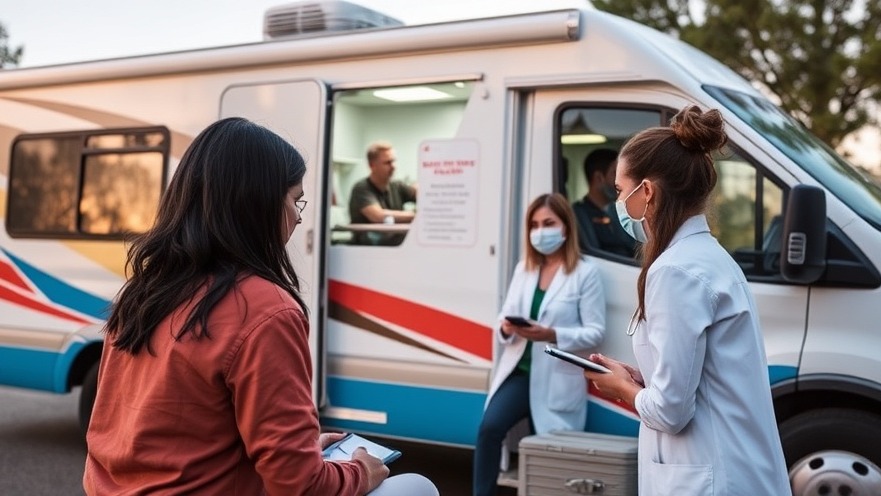Did you know that 30% of patients often miss vital follow-up care due to lack of transportation?This startling fact underscores the urgent need for innovative healthcare models that prioritize accessibility and patient-centric solutions. Collaboration in healthcare is not just a buzzword— it’s a transformative approach reshaping outcomes and empowering communities. Through the inspiring journey of Jordana Latozas and the Recovery Mobile Clinic, discover how embracing partnership over competition can break barriers and ignite systemic change in addiction medicine and beyond.
What Is Collaboration in Healthcare and Why Is It Essential?
Collaboration in healthcare refers to multiple healthcare professionals and organizations working together to provide integrated, seamless care that improves patient outcomes and system efficiency. For patients facing challenges such as transportation barriers or addiction, collaborative care models are critical to bridging gaps in access and trust.
Jordana Latozas, a nurse practitioner and founder of the Recovery Mobile Clinic, shares that “we lose around 30% of our patients to follow up because they didn’t have reliable transportation.” To overcome this, her team implemented a mobile clinic model that partners with homeless shelters, churches, and community centers to meet patients where they are. This is the essence of collaboration in healthcare: connecting diverse stakeholders beyond traditional clinic walls to create a supportive network around vulnerable populations.
Collaboration also fosters innovation by breaking down silos between local health care and nonhealth care organizations. For example, Latozas emphasizes how “we partner with organizations like the Salvation Army, Department of Corrections, and are working on agreements with the VA,” exemplifying how interprofessional and cross-sector collaboration expands reach and resource effectiveness. This integrative approach is vital in addiction medicine, where stigma and fear traditionally limit care delivery.

Examples of Collaboration in Healthcare Driving Change
The Recovery Mobile Clinic exemplifies how collaboration in healthcare can be operationalized for real-world impact. Starting as a single RV-based clinic in Michigan in early 2020, Jordana’s vision quickly grew into multiple mobile units through strategic partnerships. During the COVID-19 pandemic, her clinic adapted to provide essential testing to enable homeless individuals safe shelter access, positioning the mobile clinic as a vital service rather than a “problem.”
According to Jordana, “there was a huge fear and stigma in the healthcare profession and community when working with individuals suffering from substance use disorder. But offering COVID testing was a needed service that showed we were a solution.” This shift occurred because the clinic collaborated closely with local shelters and municipalities, helping to build trust and expand acceptance—a powerful example of collaboration in healthcare dismantling barriers and enhancing population health.
By tailoring services to each community’s unique needs and leveraging local resources, the Recovery Mobile Clinic demonstrates that collaboration is not about duplicating efforts or competing but about complementing each other’s strengths for amplified impact.
How Healthcare Professionals Can Collaborate Effectively
Effective collaboration in healthcare requires a shift in mindset toward partnership and shared goals. Jordana Latozas advocates for “therapeutic communication” and “meeting people where they are” as core principles when engaging patients, especially in addiction medicine. This patient-first approach establishes trust, which is essential when dealing with historically marginalized populations.
Collaboration across healthcare professions also means openly working “not as competitors but as comrades,” says Jordana. By negotiating with an aim to complement rather than compete, organizations can customize services to fill specific gaps at community sites. This level of flexibility is a unique advantage of mobile healthcare models in addiction treatment but is applicable broadly.
In practice, collaboration often involves multidisciplinary teams including nurse practitioners, physicians, counselors, and social workers, aligning clinical care with social support. Jordana shares that "we are 'teaching and empowering healthcare to change' by training other practitioners on how to engage difficult-to-reach populations.” This educational component expands collaborative capacity nationwide, enabling replication of successful mobile clinic models.
Training and Empowerment: The Next Step in Collaboration
The Recovery Mobile Clinic not only provides direct patient care but also focuses on training healthcare providers to adopt collaborative and compassionate approaches to addiction treatment. Jordana is spearheading efforts to create a blueprint for practices nationwide, designed especially for nurse practitioners and physician assistants entering full practice authority.
This initiative supports “nurses to open their own clinics with connections to large national partners,” allowing decentralized but networked collaborative care. Jordana’s vision demonstrates that collaboration in healthcare goes beyond clinical teamwork—it extends into systemic transformation through education and empowerment.
Collaborative Activity |
Description |
Impact |
|---|---|---|
Mobile Clinic Partnerships |
Working with shelters, community centers, and correctional facilities |
Expanded access to hard-to-reach populations |
Therapeutic Communication Training |
Educating providers on patient engagement in addiction medicine |
Improved patient trust and retention |
Volunteer and Donation Collaboration |
Community-driven donations, such as clothing and supplies |
Enhanced clinic resources and patient engagement |
National Network Building |
Connecting mobile clinics with national organizations and funders |
Scalable and sustainable healthcare access model |
Common Challenges and How Collaboration Overcomes Them
Launching and scaling a collaborative healthcare initiative is not without obstacles. Jordana Latozas candidly discusses the significant hurdles posed by the COVID-19 pandemic, stigma, and financial constraints. She shares an inspiring anecdote about distributing hundreds of business cards at vaccination events just to get “one person to pay attention” — illustrating perseverance in overcoming barriers through collaboration and outreach.
Financial sustainability is another challenge. The Recovery Mobile Clinic operates as a 501(c)(3) nonprofit that relies heavily on donations to fund patient care, especially for underinsured patients facing costly co-pays. Jordana explains, “100% of donations go directly into our Patient Recovery Fund to assist those patients,” highlighting how collaborative fundraising efforts are essential to sustaining innovative programs that traditional healthcare systems overlook.
Moreover, Jordana underscores the importance of building a strong support team—including financial experts and mentors—to navigate complex operational challenges. She advises other healthcare entrepreneurs to “know your weaknesses and hire help early,” ensuring the collaboration extends into business functions to optimize growth and impact.
Quotes from Jordana Latozas on Collaboration and Overcoming Fear
“I joke that they kind of saw me as the Pied Piper. But when COVID hit, we proved we weren’t the problem—we were the solution.” – Jordana Latozas, of Recovery Mobile Clinic
“We don’t view anybody as competition. We’re comrades. When you collaborate with that mindset, everybody benefits and walls come down.” – Jordana Latozas, of Recovery Mobile Clinic
“If you want sobriety or success, the mindset has to be there. It’s the magic sauce—more important than systems and strategies.” – Jordana Latozas, of Recovery Mobile Clinic
Why Collaboration Matters More Than Ever in Healthcare
Healthcare is evolving rapidly, and the traditional model of isolated clinical silos can no longer meet community needs effectively. Collaboration in healthcare is becoming the cornerstone of innovation, improving patient outcomes, reducing duplication of services, and increasing resource efficiency.
Jordana’s journey highlights how collaboration builds trust—both with patients and between organizations—crucial for addressing complex issues like addiction. Her mobile clinic bridges gaps by joining forces with local entities and national partners, delivering healthcare on patients’ terms. This participatory model empowers not only patients but also healthcare providers by expanding their capacity to serve diverse communities.
Ultimately, collaboration transforms healthcare from a fragmented system into a cohesive ecosystem focused on wellness, equity, and sustainability.
What You'll Learn
The critical role of collaboration in healthcare to overcome access barriers and stigma
How mobile clinics and community partnerships enhance addiction medicine and primary care integration
Strategies for healthcare professionals to cultivate collaborative mindsets and effective teamwork
Challenges encountered in healthcare innovation and proven solutions through partnership
Ways to support and replicate successful models like the Recovery Mobile Clinic nationally
Frequently Asked Questions about Collaboration in Healthcare
Why is collaboration important in healthcare?
Collaboration is vital because it enables providers to coordinate care, share resources, and offer comprehensive services tailored to patient needs, especially for vulnerable populations. It reduces care fragmentation, improves outcomes, and enhances patient satisfaction.
What is an example of collaboration in healthcare?
An example is the Recovery Mobile Clinic, which partners with shelters, correctional facilities, churches, and governmental agencies to bring addiction treatment and primary care directly to underserved patients.
How do you collaborate with other health care professionals?
Collaboration involves building relationships based on trust, open communication, and shared goals. It includes regular interdisciplinary meetings, training on therapeutic communication, and fostering environments where all team members contribute their expertise.
What is true about the collaborative approach in healthcare?
The collaborative approach prioritizes partnership over competition, focuses on patient-centered care, adapts to community needs, and leverages diverse skill sets and resources for holistic health solutions.
Key Takeaways
Collaboration in healthcare breaks down barriers of access, stigma, and fear, especially in addiction medicine.
Mobile clinics linked with community partners demonstrate a scalable model for delivering primary and addiction care.
Successful collaboration requires therapeutic communication, flexibility, and a mindset of partnership, not competition.
Training and empowering healthcare providers are essential for replicating innovative models nationwide.
Financial sustainability through donations and strategic partnerships supports long-term program impact.
Conclusion
To drive meaningful healthcare innovation, embrace collaboration that breaks traditional boundaries. Connect with community partners, invest in provider training, and create networks that empower patients and practitioners alike. By doing so, you contribute to building a healthier, more equitable future.
Support the Mission of Recovery Mobile Clinic
Inspired by Jordana Latozas and the Recovery Mobile Clinic’s collaborative vision? Join the movement by visiting www.recoverymobileclinic.com. Your donations directly fund patient care through the Patient Recovery Fund, aiding underinsured and uninsured individuals struggling with addiction. Non-monetary contributions like clothing and supplies are also welcomed to support outreach efforts.
Every act matters—share awareness, break stigma, and help expand this life-changing model nationwide.

 Add Row
Add Row  Add
Add 




Write A Comment